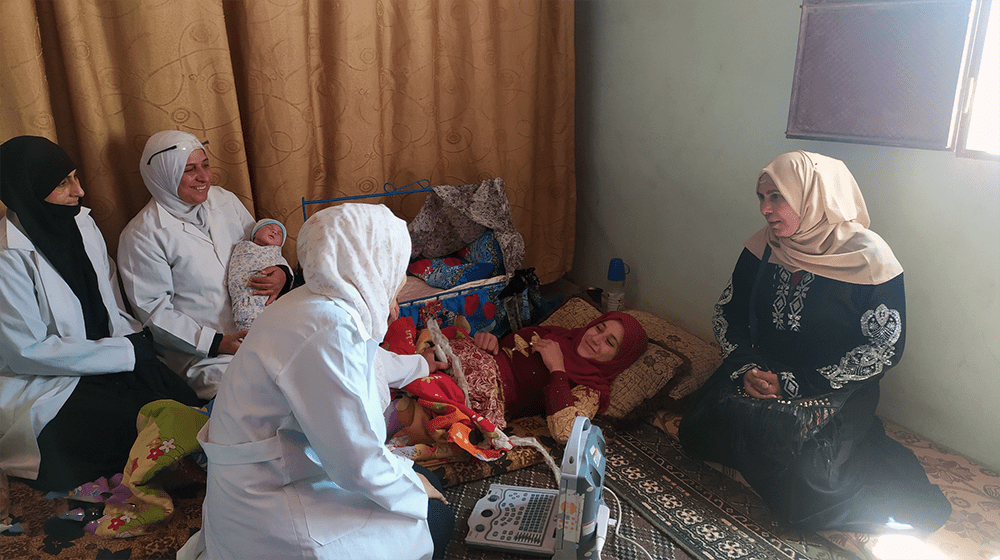“I woke up with a heavy cramping, my labour had started. I prayed for the baby and for myself that all would be well and that I would give birth without complications like the birth of my first daughter” recalls Fatima, 19 year old.
UNFPA’s team visited the city of Al Bukamal, Deir ez-Zor Governorate located in eastern Syria on the border of Iraq with a population of approximately 35,000. This was the first visit for UNFPA team members from Damascus. Deir ez-Zor Governorate has been severely impacted by the years of crisis in Syria; over half of the health facilities are not functioning and there is only one public hospital in Deir ez-Zor City operating at full capacity offering free health services. In Al Bukamal, there are two private hospitals and only one offers emergency obstetric care. The devastating impacts of the crisis in Deir ez-Zor have left thousands of people, including women and adolescent girls, without safe and affordable access to reproductive health services and deprived them of life-saving health interventions such as emergency obstetric care. This is the story of Fatima.
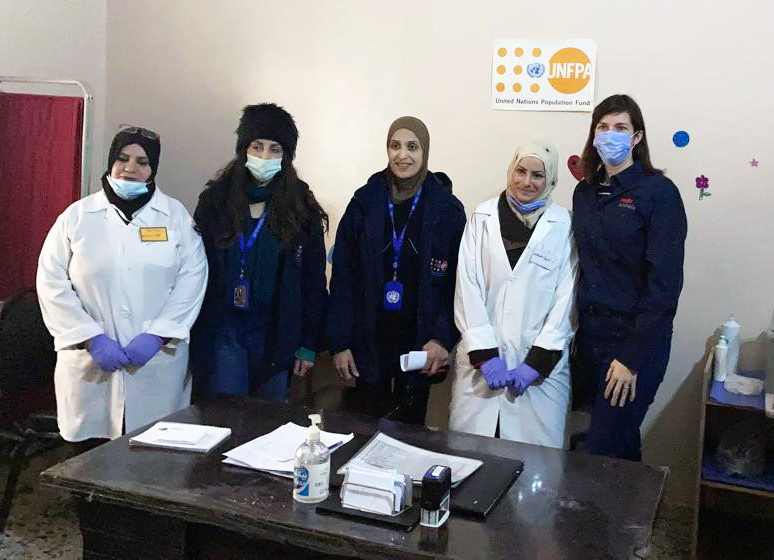
UNFPA staff with the gynecologist and midwife at UNFPA-supported static clinic in Mayadeen city - 50 km east of Deir ez-Zor city. © UNFPA /2022
“I woke up my husband, and he called our neighbour to take us in his car to the midwife’s house”, Fatima shared while emphasizing the difficulty to travel at night, but they had no choice. Fatima knew the midwife well as she had visited her four times during her pregnancy for antenatal care to make sure the baby was growing, and she was healthy.
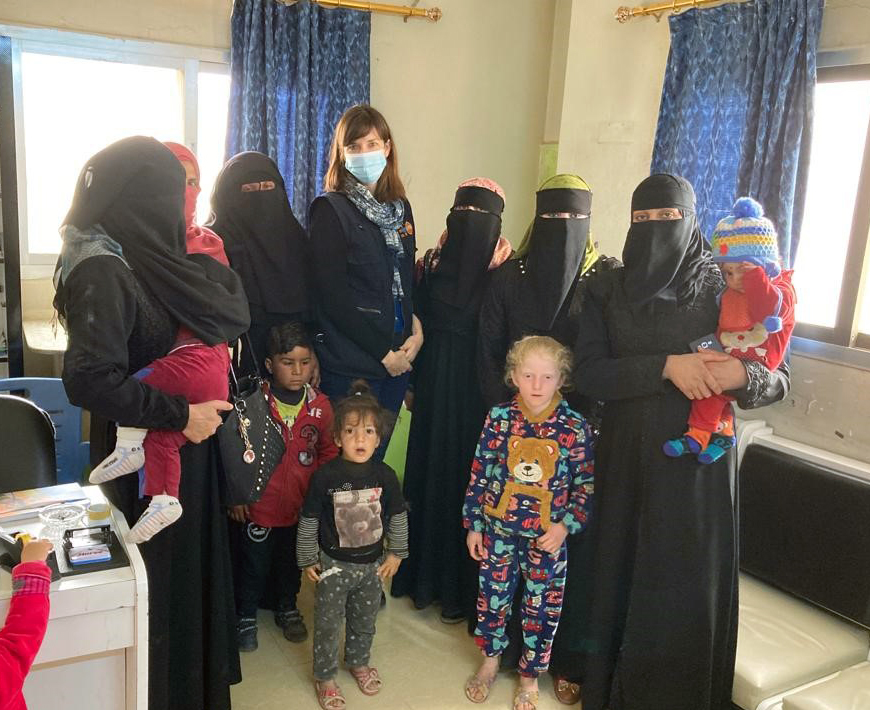
UNFPA staff with a group of women and their children who received reproductive health services in ‘Sham’, the UNFPA-supported health facility in Al-bu Kamal city. © UNFPA /2022
Thankfully, Fatima and her husband did not experience delays on her way to the midwife’s house. Fatima continued to labour at the midwife’s home; however, the midwife realized that the delivery might necessitate a cesarean section, which would require the support of a gynecologist. The midwife called the gynecologist working at the only private hospital in Al Bukamal. At night, the hospital is closed and only opens for emergencies, so calling beforehand is essential to allow the doctor time to open the facility.
The midwife arranged a private car to take Fatima and her husband to the private hospital as there were no ambulances available. The gynecologist was able to safely perform a cesarean section.
“I was relieved and overjoyed to welcome my newborn. Unfortunately, this relief was short-lived as the bill for the cesarean section was 400,000 Syrian Pounds (approximately 105 USD at the time of the birth). Me and my husband could not afford this, as we are farmers and our income is seasonal and harvest time is still months away”, explains Fatima.
Fatima’s mother-in-law had to ask relatives for support to meet the costs and they were able to cover the bill collectively. Fatima is grateful that her baby was born healthy but like many other pregnant women in Syria, she worries about how she will be able to afford the cost of delivering another baby.
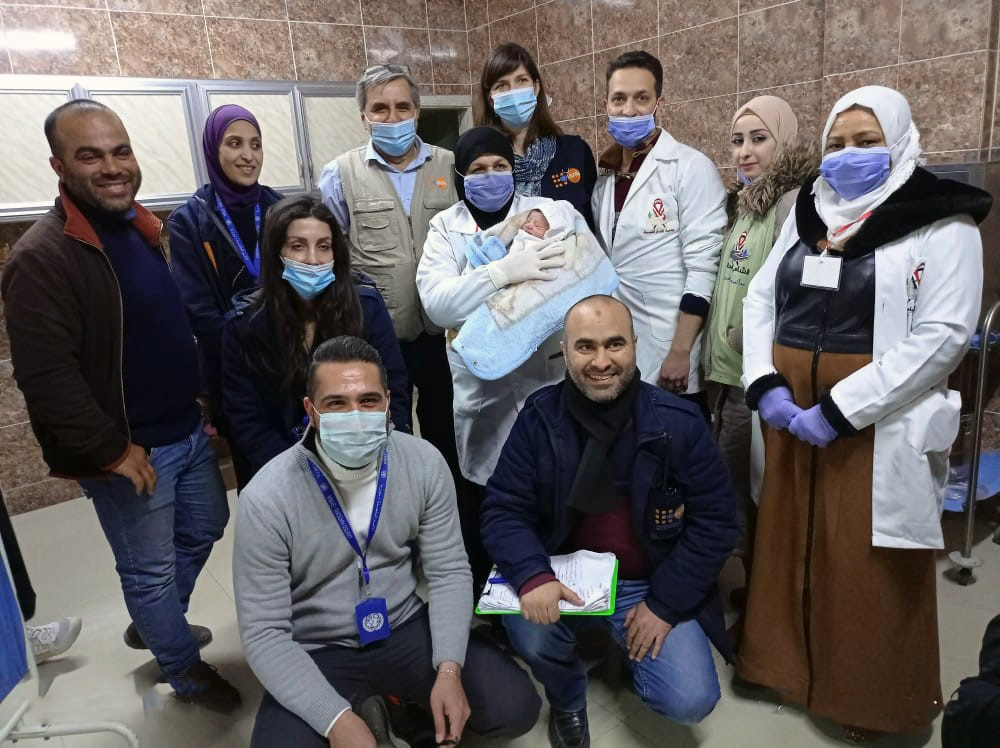
UNFPA team with the medical staff in "Sham " facility in Al-bu Kamal city, celebrating the safe delivery of a newborn baby © UNFPA /2022
Fatima’s story highlights the lack of access to essential and lifesaving reproductive health services many women are facing in Deir ez-Zor, while shedding light on the vital role that midwives play. Free obstetric care services are scarce; there is a severe lack of health workers in the Governorate and the plummeting of the Syrian Pound, low salaries, lack of available accommodation and high costs of transport makes it incredibly difficult to attract and retain health staff in Al Bukamal. Due to the lack of affordable services women pay private midwives or doctors to deliver, which can be incredibly expensive. Some families resort to harmful coping mechanisms to raise the funds; they might sell livestock or land which will negatively impact their livelihood and be damaging into the future.
In response to the dire needs, UNFPA is supporting a local NGO, Sham for Health, to work in Al Bukamal and provide free essential sexual and reproductive health services through two mobile teams and a newly established midwifery network. Due to the difficulties accessing services, the mobile teams travel to remote areas to provide integrated sexual and reproductive health and gender-based violence prevention and management services. Sham for Health also provides essential SRH services, including antenatal, postnatal care, treatment of reproductive infections and supports uncomplicated deliveries through a private hospital.
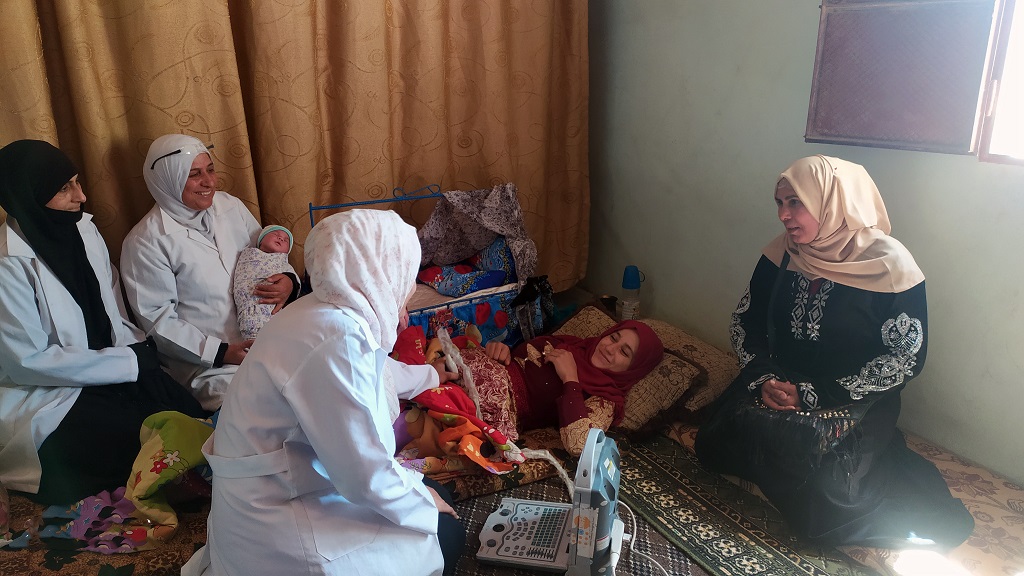
The medical mobile team in a follow up visit to Adlah, at her home for post- natal care service in Qureyah village, Deir ez-Zor © UNFPA /2022
Midwives save lives. Well-trained midwives could help avert roughly two thirds of all maternal and newborn deaths.[1] They could also deliver 87 per cent of all essential sexual, reproductive, maternal and newborn health services. Yet only 42 percent of people with midwifery skills work in the 73 countries where more than 90 percent of all maternal and newborn deaths and stillbirths occur. Since 2008, UNFPA has worked with partners, governments and policymakers to help build a competent, well-trained and well-supported midwifery workforce in low-resource settings. UNFPA focuses on four key areas: strengthening competency-based midwifery training; developing strong regulatory mechanisms to ensure quality services; raising the voices of midwives by establishing and strengthening midwifery associations; and advocating for increased investments in midwifery services. UNFPA also works to create a supportive environment for midwives by advocating for adequate workforce policies for midwives.[2]
__________________________________________________________
[1] UNFPA, International Federation of Midwives, WHO. 2021. State of the World’s Midwifery report https://www.unfpa.org/sites/default/files/pub-pdf/21-038-UNFPA-SoWMy202…

